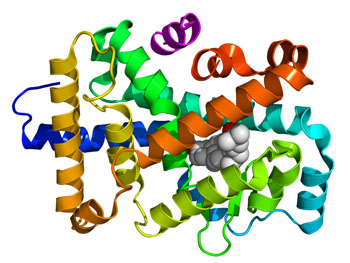Indirect Inhibition of Overexpressed Androgen Receptor Activity Halts Growth of Castration-Resistant Prostate Cancer
By LabMedica International staff writers
Posted on 13 Apr 2016
Cancer researchers have shown that by suppressing the nuclear receptor protein ROR-gamma with small-molecule compounds they could reduce androgen receptor levels in castration-resistant prostate cancer and stop tumor growth.Posted on 13 Apr 2016
The androgen receptor (AR) is overexpressed and hyperactivated in human castration-resistant prostate cancer (CRPC). However, the factors that cause AR overexpression have not been thoroughly studied.

Image: Space-filling model showing the crystallographic structure of the ligand binding domain of the ROR-gamma (receptor–related orphan receptor gamma) protein (Photo courtesy of Wikimedia Commons).
Investigators at the University of California, Davis (USA) worked with prostate cancer cell cultures and mouse xenograft models. They reported in the March 28, 2016, online edition of the journal Nature Medicine that retinoic acid receptor–related orphan receptor gamma (ROR-gamma) was overexpressed and amplified in metastatic CRPC tumors, and that ROR-gamma drove AR expression in the tumors. ROR-gamma recruited the proteins nuclear receptor coactivators 1 and 3 (NCOA1 and NCOA3) to an AR–ROR response element (RORE) to stimulate AR gene transcription.
The investigators showed that drugs that blocked ROR-gamma suppressed the expression of both AR and its variant AR-V7 in prostate cancer cell lines and tumors. Drugs that blocked ROR-gamma suppressed tumor growth in multiple AR-expressing xenograft prostate cancer models. The drugs were not effective in AR-negative models. In addition, ROR-gamma blockers effectively sensitized CRPC tumors to the drug enzalutamide, without overt toxicity, in mice.
"This is a new target and a totally new way of hitting prostate cancer," said senior author Dr. Hongwu Chen, professor of biochemistry and molecular medicine at the University of California, Davis. "This strategy targets the root cause of the problem - the overexpression of the AR gene and its protein."
"ROR-gamma has been extensively studied as a target for rheumatoid arthritis, inflammatory bowel disease, psoriasis, and other autoimmune conditions," said Dr. Chen. "Some of the drugs are orally available and have been found to be safe in early clinical trials. They could be a great help for patients with advanced prostate cancer."
Related Links:
University of California, Davis













